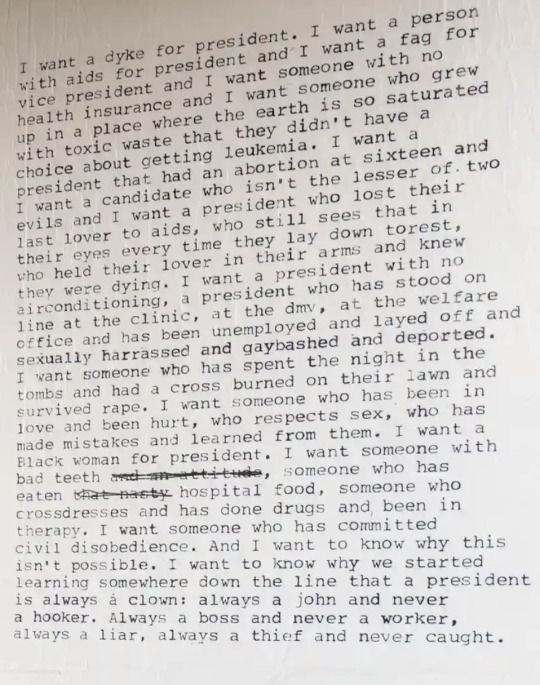#zoe leonard
Text
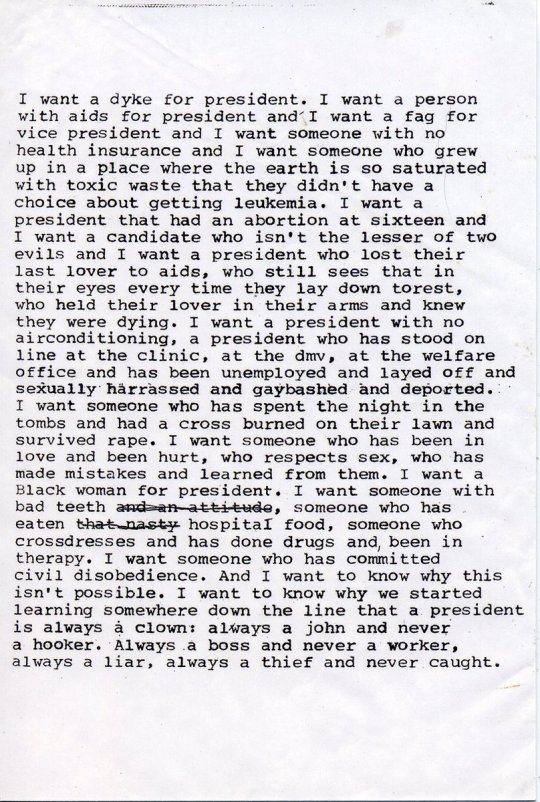
Zoe Leonard
427 notes
·
View notes
Text
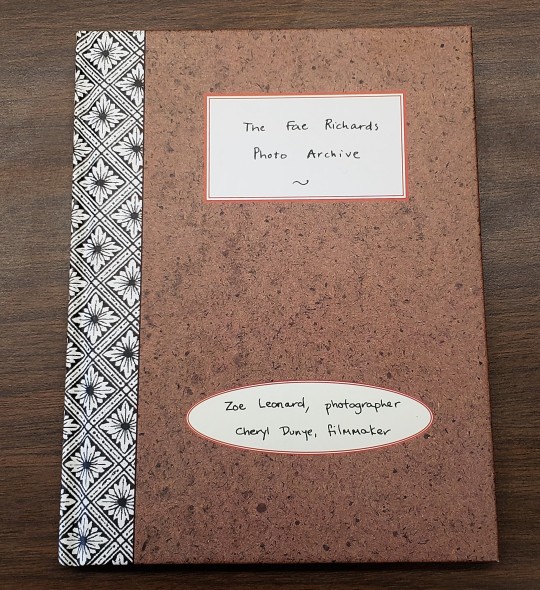


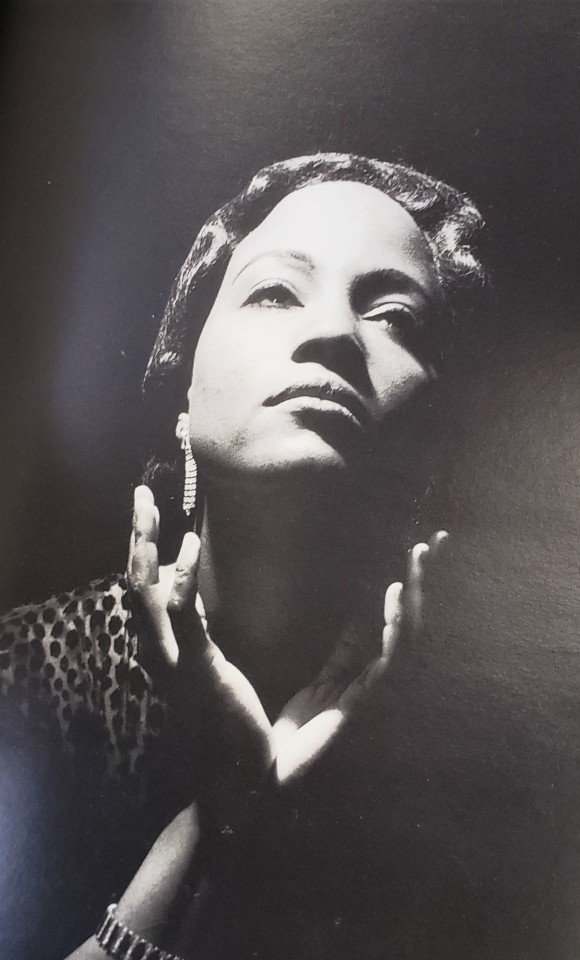
Past and Present: Cheryl Dunye’s The Watermelon Woman
Last year, Special Collections and Archives at the University of Iowa Libraries acquired items to form a new collection: the Black Film and Television Collection. In honor of Black History Month, we’re shining a spotlight on a different item from this collection each week.
In yesterday’s post, we discussed the original script for 1971’s Shaft, a defining entry in the Blaxploitation genre. Our final spotlight shines on a unique photo book from 1996, when Cheryl Dunye’s The Watermelon Woman attempted to excavate the history of queer Black women on screen.
Cheryl Dunye and New Queer Cinema
With The Watermelon Woman, Dunye became the first Black lesbian to direct a feature film. This movie belongs to a genre that came to be called New Queer Cinema, a movement in independent film during the 1990s that placed queer characters at the center.
The film was critically acclaimed and regarded as one of the foundational films of the genre, and it was added to the Library of Congress’ National Film Registry in 2021.
It also gave new momentum to Dunye’s career in film and television, which continues to this day. Her recent directing credits include The Umbrella Academy, Bridgerton, and Queen Sugar.
Unnamed & Uncredited
The Watermelon Woman stars writer and director Cheryl Dunye as an aspiring documentarian who works at a video rental store. Dunye’s fictional proxy, also named Cheryl, is fascinated by the history of Black women in film, particularly those who went unnamed and uncredited for roles portraying the racist archetypes that were common in the cinema of the 1930s and 40s.
In the movie, Cheryl embarks on a journey to discover the name of Black actress only identified as “The Watermelon Woman.” She eventually uncovers the woman’s real name, Fae Richards, and discovers that she, too, was a queer woman.
A Supplementary Archive
Fae Richards may be a fictional character, but she stands for countless queer Black people whose stories have been omitted from the record. Artist Zoe Leonard, in collaboration with Cheryl Dunye, created The Fae Richards Photo Archive, a series of 82 images that document the life of this fictional character. From candid shots, family photos, and publicity pictures, every image matches a time and place of this character. As the Whitney Museum of American Art explains, “Leonard acknowledges the project’s artifice, encouraging the viewer to recognize that she had to create a story that is fictional, but rings true, because the real life counterparts of such stories went undocumented.”
This statement demonstrates exactly why many archives are, or need to, work to fix the mistakes of the past. As a school with a rich screenwriting history, it is why the University of Iowa Libraries is actively working to collect more stories from Black cinema.
A Century of Black Film
During this series, we’ve looked at four iconic examples of Black filmmaking. But that’s not to say that the work of Black filmmakers can be reduced to four eras, or that the films we discussed are more important than those that didn’t make this list. There’s so much more to discover in the Black Film and Television Collection, and if you’ve enjoyed this blog series, we encourage you to check out what’s available online. As The Watermelon Woman attests, the preservation of these stories, and the names and lives behind them, is vital and rewarding work.
--Natalee Dawson, Communication Coordinator at UIowa Libraries, with assistance from Liz Riordan, Anne Bassett, and Jerome Kirby
#watermelon woman#libraries#blackhistorymonth#black film#uiowaspecialcollections#film#uiowa#black history matters#Cheryl Dunye#Zoe Leonard#Fae Richards
100 notes
·
View notes
Text
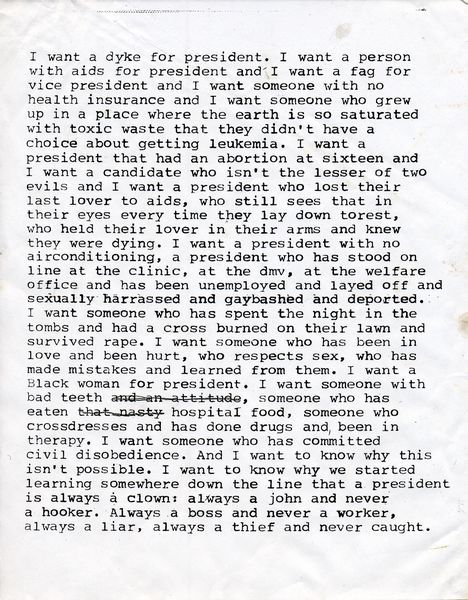
Zoe Leonard - 'I Want a President' (1992)
“I want a dyke for president…” form the opening lines for the battalion of critical incisiveness and queer radical spirit that is Zoe Leonard’s 1992 piece ‘I Want a President’. Surging forth into the American public realm following the fatal negligence of Reagan’s administration during the AIDS epidemic and the next presidential election run-up, ‘I Want A President’ dared to interrogate the fundamental denial of marginalised bodies, minds and experiences in the political arena. Constituting a poignant position in the broader visual languages of AIDS activism and queer resistance, ‘I Want A President’ broke ground in inspiring and furthering a critical modality of hope. Its impassioned sentences at once demand empathy and humanity from authoritative figures. Leonard’s statements queer the metrics of power that vehemently deny those outside of cis-heteropatriarchal society by providing currency in promoting otherwise silenced voices, and reestablishing their lived experiences as ethically fundamental in the articulation and implementation of policies that account for real citizens.
Functioning as a key catalyst for ‘I Want A President’, Leonard was inspired by the dynamism of fellow lesbian poet and artist Eileen Myles’ presidential bid in the 1991-1992 presidential election, alongside Bill Clinton, George W. Bush and Ross Perot. Myles herself charged up by Bush’s lamentations of “the politically correct” (which implied an intended diminution of the voices of women, people of colour and LGBTQ+ critiquing hegemonic political assertions) in his commencement address galvanised an intellectual juncture that scrutinised the supposed impossibility of an openly female, openly queer president in the mainstream American consciousness. Acting in symbiosis to Myles’ work and presidential candidacy, Leonard was (and remains) a prominent and active member of queer activist collectives like Fierce Pussy, and her political praxis and astute artistic sensibilities informed the dissemination and distribution of ‘I Want A President’. Formerly intended to be a statement for an underground LGBTQ+ publication, the piece was printed as a Xerox document and circulated amongst Leonard’s friends, wider queer social circles and activist cohorts. It rapidly rumbled outwards into the wider public space, levying a challenge to the unfeeling political elite through progressive prose that illuminated the standpoints of those most denigrated in American ideology and dogma.
Spanning experiences of targeted violence, poverty, and disenfranchisement, the rhythmic structure of ‘I Want A President’ is arresting in its unflinching engagement with state-enabled trauma interwoven with empathic sentences expressing solidarity with those who continue to survive despite the odds. Grappling with legacies of lethal indifference in institutional engagement with the AIDS crisis, environmental damage bolstered by social inequalities, and sustained acts of gender-motivated attacks, Leonard’s calls and aspirations for a feeling, loving and reflexive leader remain tantamount in the contemporary era. The concluding lines “Always a boss and never a worker, always a liar, always a thief and never caught” is deeply evocative as a searing indictment against acts of blatant corruption and incitement of destructive community tensions by political elites able to evade culpability through immense social privileges. ‘I Want A President’ and its power lies in its calibration of empathy as a lightning rod for action, to make the yearning for difference not a mawkish instinct, but a place of generative resistance against political systems that seek to elicit apathy from sustained deprecation of those who fall outside of the power lines on the basis of race, gender, sexuality, class, ability and beyond.
‘I Want A President’ continues to have vibrant reverberations in contemporary political and queer counterculture. In 2016, it was erected under Manhattan’s High Line, a New York park built upon a disused elevated railway, proclaiming its moving and robust prose to a new public audience in the run-up to the 2016 election which devastatingly saw in the presidency of Donald Trump, reminding us all too much of what ‘I Want A President’ advocates against. Leonard’s powerful work continues to garner creative inspiration amongst queer artists, notably being read by queer rapper and artist Mykki Blanco, directed as part of a film by Adinah Dancyger in 2016, providing a reading that was passionate, imbued with immense political frustration that made its words all the more visceral in the face of Trump’s eventual inauguration. In 2018, the piece was reprinted with 100 copies and distributed in aid of the Treatment Action Group, a community-based think tank producing bold, advancing research into AIDS/HIV and other conditions in the pursuit of LGBTQ+, gender and racial liberation. The timelessness and transience of ‘I Want A President’ is made clear in its sustained relevance in the fluctuations in the national political milieu, demonstrating its significance as a queer cultural artefact that inspires fights for justice across multiple social intersections.
Leonard continues to enjoy a lustrous artistic career, and is now represented by the Hauser & Wirth gallery, where ‘I Want A President’ was celebrated and honoured for its cultural impact and staying power. Translating the piece’s deep insights and challenges against discriminatory political dominance in the British context, one can foster ‘I Want A President’ in expressing their disavowal of political acts devoid of empathy and basic human respect. Namely the state hatred of trans and genderqueer people in the name of political point-scoring, the loathsome class stigmatisation of current prime minister Rishi Sunak in his boasting of defunding what he deemed ‘deprived’ urban areas and the skyrocketing levels of financial precarity and homelessness under a fractious economic system. Leonard’s ruminations and desires in ‘I Want A President’ remain emblematic of the potency of queer activism and eternally vital, in demanding better representation, for politicians that care, that feel, that emote, that dare to think holistically beyond the sinister motivator of unbridled capitalistic power.
15 notes
·
View notes
Text

I Want A President (1992) by Zoe Leonard
8 notes
·
View notes
Photo
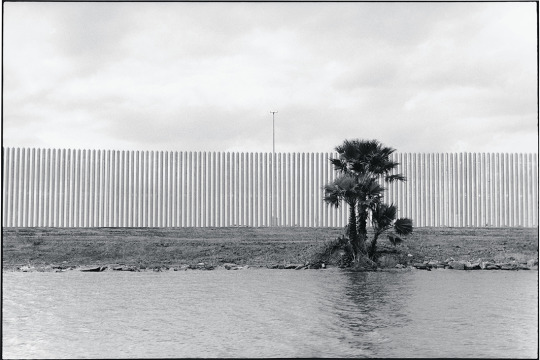
Zoe Leonard, Al río/To the River (detail), 2016–22, gelatin silver prints, C-prints, ink-jet prints, dimensions variable.
30 notes
·
View notes
Photo
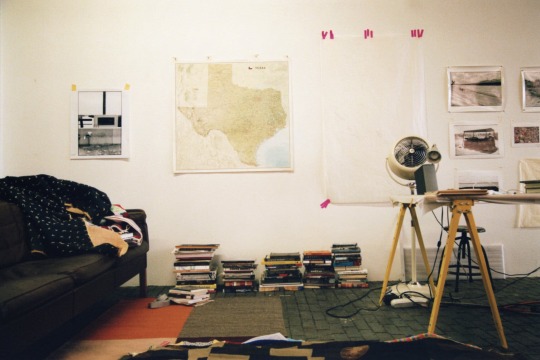
Photographer Zoe Leonard’s studio
Looking at artist studios makes me feel better about my apartment which is basically just piles of records and books and things pinned to the wall.
via The New York Times
22 notes
·
View notes
Text

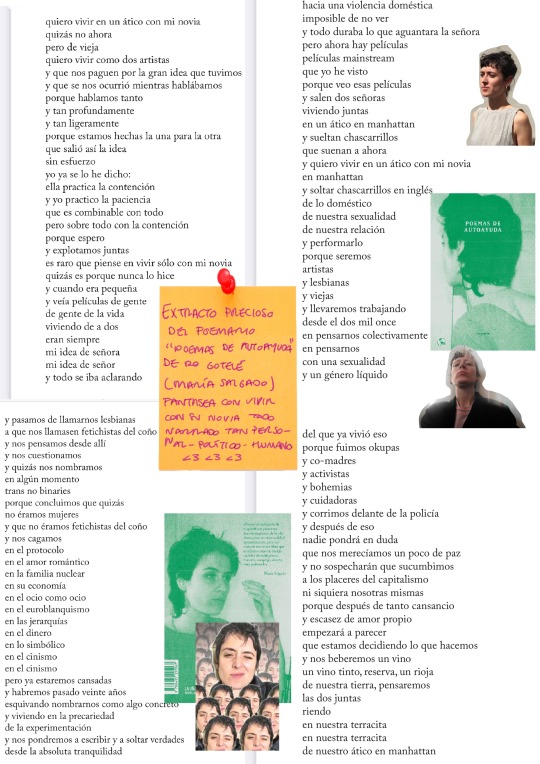
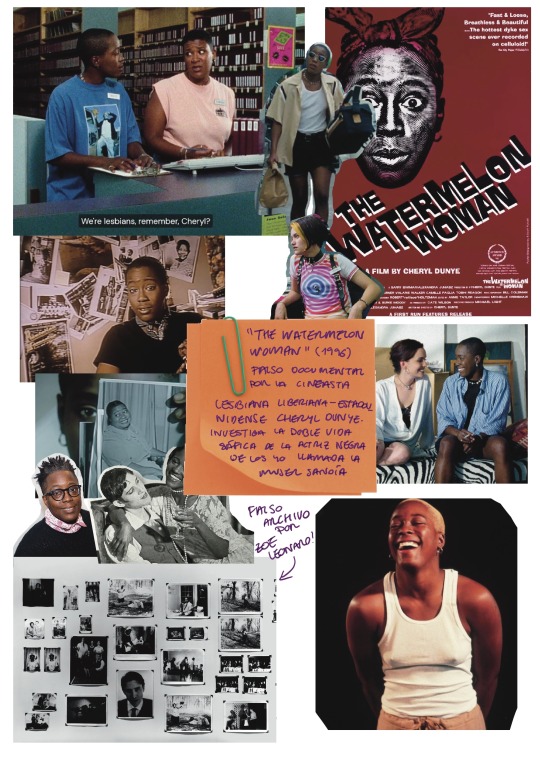

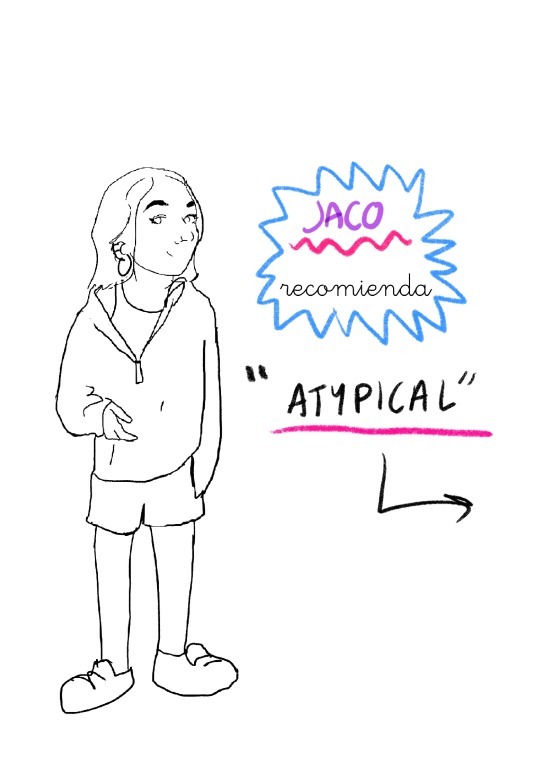
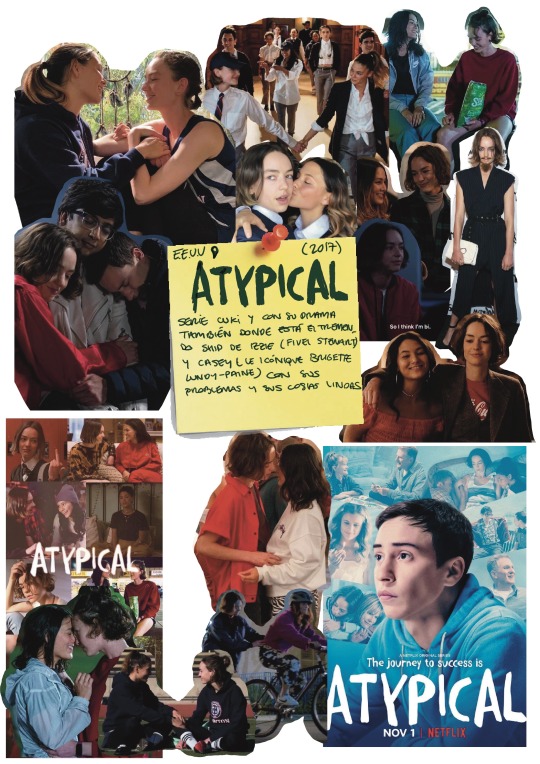
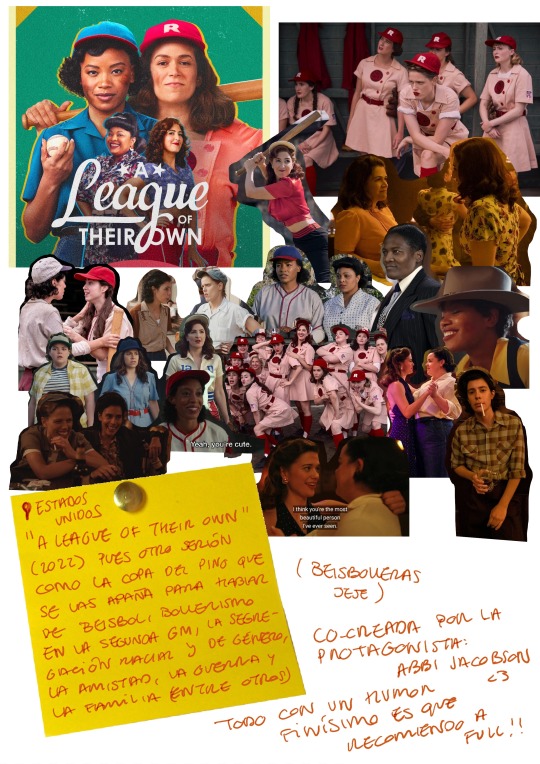



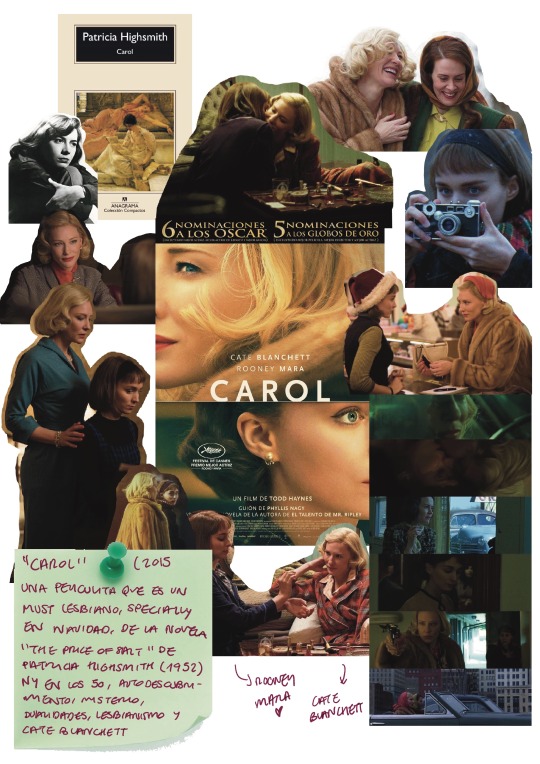
f-ficción
#ficcion#minuscula#archivo de margenes#ro gotele#the watermelon woman#cheryl dunye#zoe leonard#jennifer prince#atypical#a league of our own#retrato de una mujer en llamas#eros/psyche#carol
6 notes
·
View notes
Text
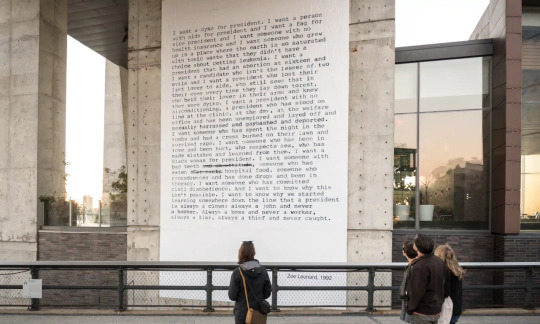
“I want a president” is a poem written by artist Zoe Lenard in 1992.
In October 2016, High Line Art installed a large version of the poem, measuring 20 feet by 30 feet, on a pillar underneath The Standard Hotel on the High Line, in the Chelsea neighborhood of Manhattan.
"I want a dyke for president. I want a person with AIDS for president and I want a fag for vice president and I want someone with no health insurance and I want someone who grew up in a place where the earth is so saturated with toxic waste that they didn’t have a choice about getting leukemia. I want a president that had an abortion at sixteen and I want a candidate who isn’t the lesser of two evils and I want a president who lost their last lover to AIDS, who still sees that in their eyes every time they lay down to rest, who held their lover in their arms and knew they were dying. I want a president with no air-conditioning, a president who has stood in line at the clinic, at the DMV, at the welfare office, and has been unemployed and laid off and sexually harassed and gaybashed and deported. I want someone who has spent the night in the tombs and had a cross burned on their lawn and survived rape. I want someone who has been in love and been hurt, who respects sex, who has made mistakes and learned from them. I want a Black woman for president. I want someone with bad teeth and an attitude, someone who has eaten that nasty hospital food, someone who crossdresses and has done drugs and been in therapy. I want someone who has committed civil disobedience. And I want to know why this isn’t possible. I want to know why we started learning somewhere down the line that a president is always a clown. Always a john and never a hooker. Always a boss and never a worker. Always a liar, always a thief, and never caught.”
― Zoe Leonard

3 notes
·
View notes
Text
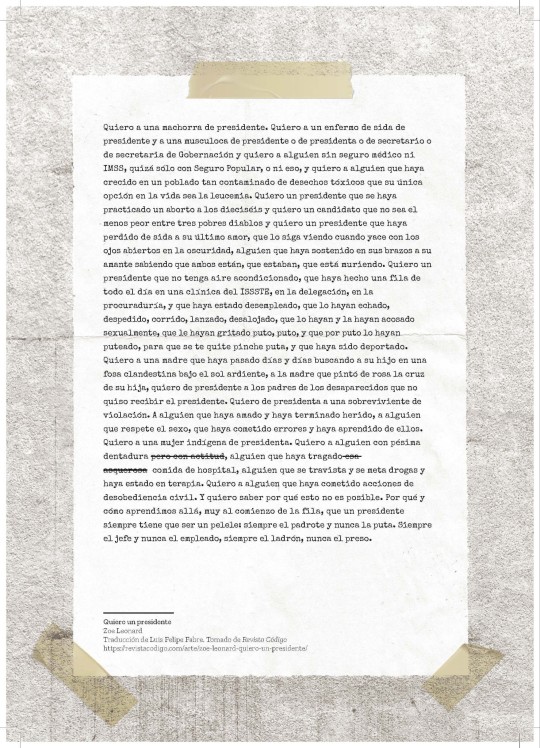
1 note
·
View note
Text
I Don't Want a President
I don't want to lead, and I don't want to follow.
I need to be accounted for, and I need to be your listener.
I am an individual, and I am my community.
I am an outsider beside others.
In fact, I don't want a leader, and I don't want my voice processed through you.
I am my voice as much as your voice deserves you.
I am not a short-term interest in the cycle of
appropriated words and empty bodies,
I am an ecosystem dependent on authenticity and lives well lived.
I want the subtle voices heard in the bodies they are rooted in.
I want ownership of my passion, my expression, and an open floor for those tired, those who rebel, as others speak for their hidden skins -as if they found them first.
In truth, I don't want anything in your name as you stand, head held high above the ground I call home.
The self-set director.
I actualise- Always I deserve, and I need now, as I always have.
My legacy will never become your missed duty.
I am the gift I made for myself with shared hands that build beside me.

#poem#i wank a dyke for president#zoe leonard#political poetry#poetry#spoken word#creative writing#lived experience#lgbtqia#queer#queer poetry#lgbtq poetry#tw#cw
1 note
·
View note
Text
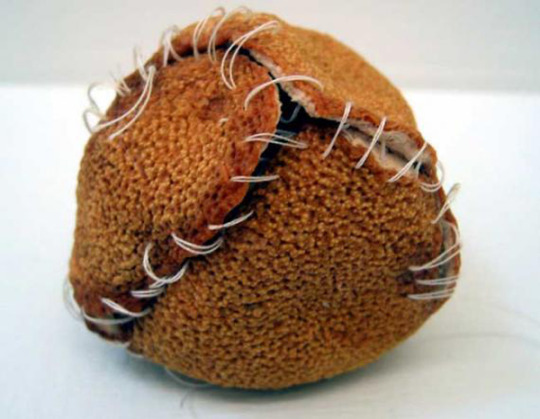


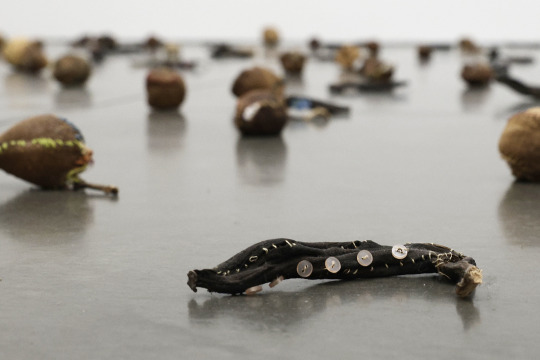

the lonely city: adventures in the art of being alone, olivia laing
0 notes
Text
Did you know that I want a dyke for president? That I want a person with AIDS for president and that I also want a fag for vice president?
Anyways.
1 note
·
View note
Text
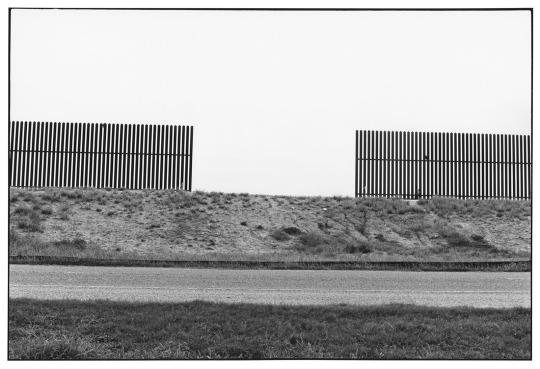
Zoe Leonard - photograph, part of “Al río/To the river” series, initiated in 2016.
1 note
·
View note

